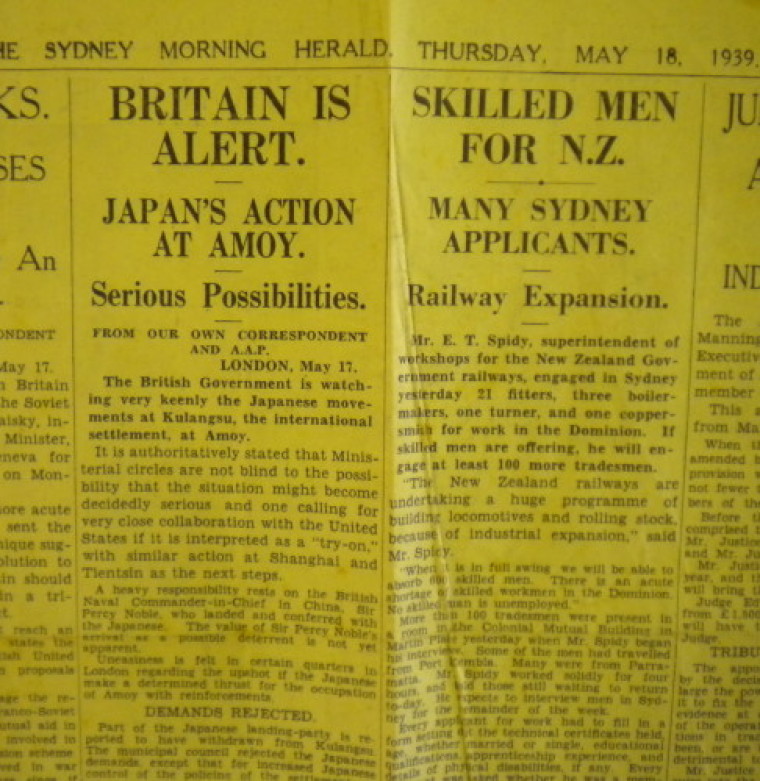
I came across an article in the family archives from The Sydney Morning Herald dated 18th May, 1939, which was entitled: "Britain Is Alert: Japan's Action at Amoy. Serious Possibilities."
As a student of history, I realised that Japan's militarism did not start with their secret and sudden attack on Pearl Harbour on 7th December 1941, which was over two years after this article was written.
In this article it is fascinating to read the words relating to their push to take Amoy, and island off the coast of China between Taiwan and the mainland, which would, in fact, have the effect of blockading China from rest of the world.
gwulo.com/A-brief-history-of-international-Amoy
Japan's militarists sought power in the early 1930s, in a period known as 'ruling by assassination'. Three Prime Ministers were bumped off and finally the military took charge and everything within the country changed 'almost' over night.
Those in government along with the public service not supportive of the militaristic ideals were shown the door. Propaganda for Japan's historic achievements in militarism (following the long tradition of the Samurai warrior) and their notion of worship of the Emperor became second nature. Even school child's lessons were redirected in this light.
The West was well aware of Japan's aggression. Japan had occupied Korea and Taiwan and engaged in the 'first Sino-Japanese War 1894-95' and many smaller battles right up to the invasion of Manchuria. However, by the 1930s Chinese nationalism was rising, and the 'second Sino-Japanese War' started in earnest in 1937 and merged within the Pacific campaigns of the Second World War.
In 1931 Japan had attacked Manchuria for its raw material wealth and this led to further conflicts inside China culminating in the 1937 Nanking siege and massacre. Because there were many western expatriots in China at the time when that country was opening up to 'foreigners' at last, people such as doctors, academics, teachers, businessmen and diplomats and missionaries related some of these Japanese atrocities to the rest of the world. This was indicative of the way a conquering Japanese army of that time might behave to the residents.
en.wikipedia.org/wiki/Nanking_Massacre
The Allies knew that in the end, regardless of the diplomacy, war was coming. Japan was pushing here and pushing there, trying it on, in this direction, then another. In the end the United States placed an embargo on oil shipments to Japan. In other words, it attempted to economically strangle Japan into submission.
This was the background to Japan seeking a strategy to strike a death blow to the American fleet in Pearl Harbour, but the problem for Japan on the 7th December 1941, when it knew that the US Navy's Aircraft Carriers were at sea on exercises.
Australia too was aware that Japan would strike their own shores. Darwin was evacuated of civilians, all except the barest essential services, and the Northern Territory was militarily strengthened. Air Force landing strips were constructed 'overnight' and vigilance was set up, expecting an invasion by sea. However, Darwin was eventually bombed on the 19 February 1942, not 10 weeks after Pearl Harbour, and by the same fleet.
Japan had taken the oil rich Dutch East Indies (Indonesia today) to gain their raw materials of rubber and oil. A Japanese invasion of Australian was strategically one step too far for the Japanese. I discussed that particular strategic issue in a recent article:
au.christiantoday.com/article/darwins-master-plan-in-wartime-1942/9369.htm
But, two years and seven months earlier than Pearl Harbour, when this Sydney Morning Herald article was published, the Allies knew Japan was on the march; and, in fact, it was written a year after the Japanese first took over Amoy.
I have often reflected on such issues when one knows something is going down, but it cannot be circumnavigated at that particular time as you are only going on very-hyped-up intuition with bits and pieces of the puzzle.
Much of life is like this where a parent knows something is wrong with a child, but just can't put a finger on it.
How to deal with these issues is never easy and there seems not to be immediate resolutions. Many Christians however, have responded to such issues with prayer, so as to seek wisdom and find clarity in such difficult circumstances.